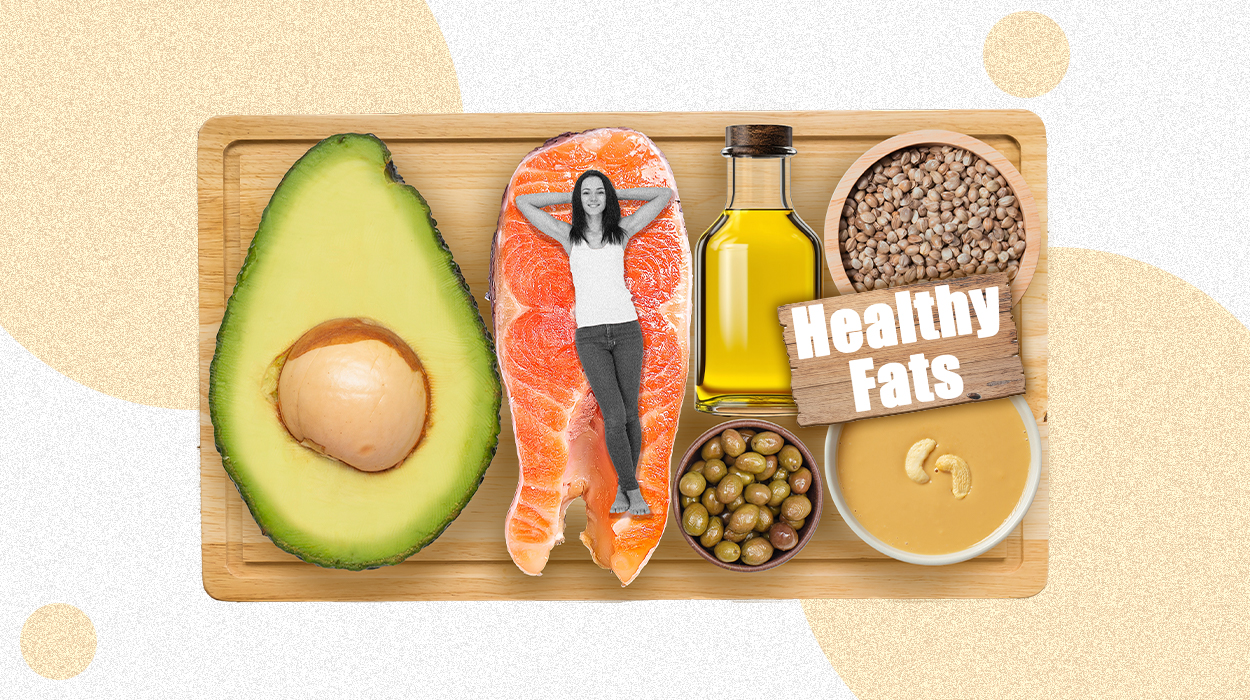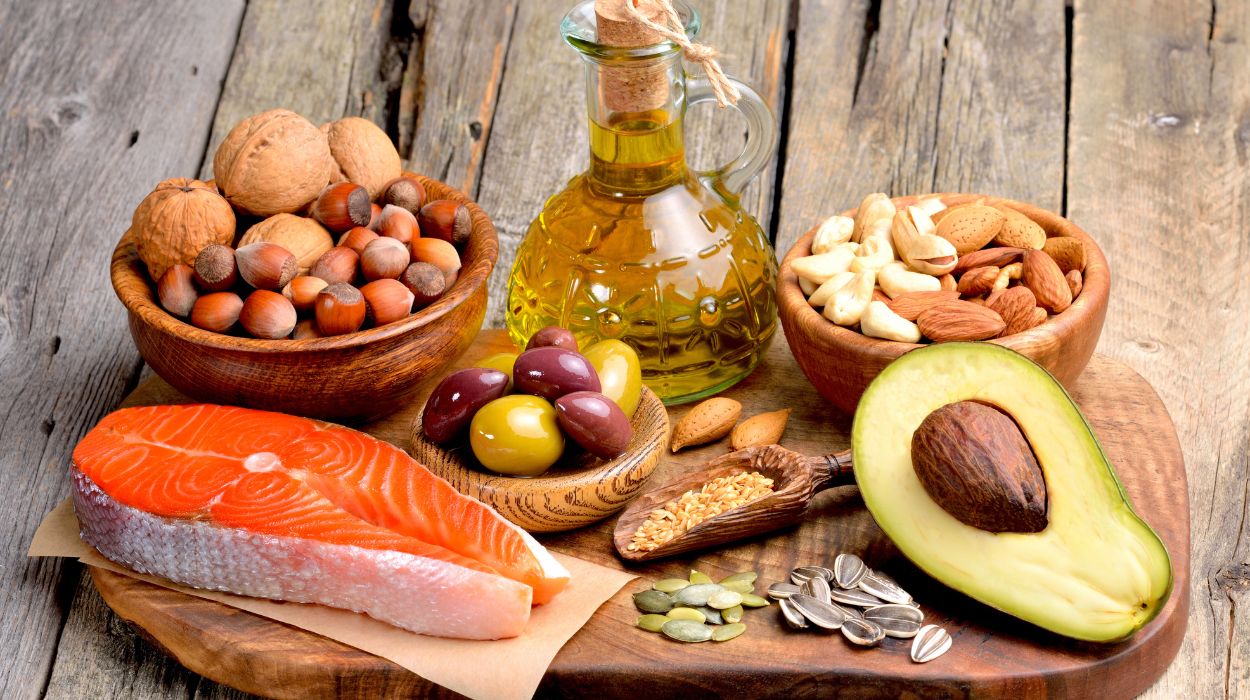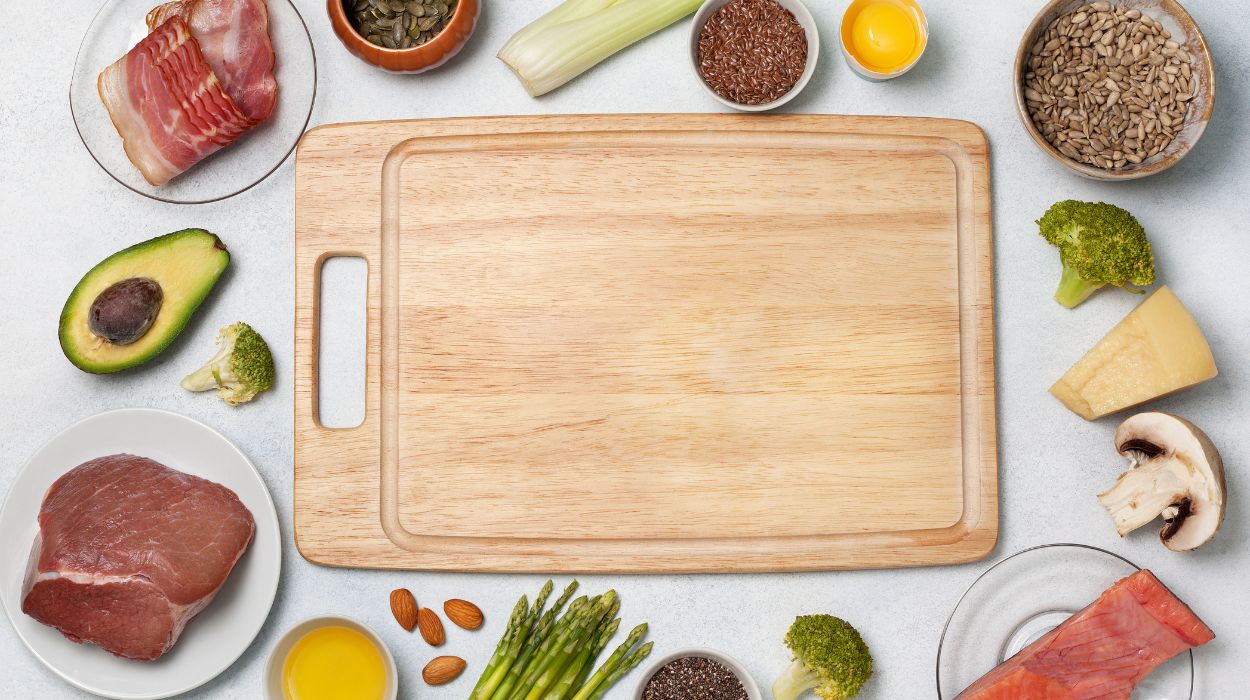 Expert's opinion
Expert's opinion
Expert's opinion
The article is a subjective view on this topic written by writers specializing in medical writing.
It may reflect on a personal journey surrounding struggles with an illness or medical condition, involve product comparisons, diet considerations, or other health-related opinions.
Although the view is entirely that of the writer, it is based on academic experiences and scientific research they have conducted; it is fact-checked by a team of degreed medical experts, and validated by sources attached to the article.
The numbers in parenthesis (1,2,3) will take you to clickable links to related scientific papers.
Healthy Fats For Keto Diet, What To Avoid & How To Eat In 2024?

One of the main goals of being on a ketogenic (keto) diet is to eat high-fat foods. This low-carbohydrate diet consists of 70-80% fat of the day’s calories. Calories from protein should equal 10-20%, and then 5-10% can come from carbohydrate sources.
Several health benefits come from being on a keto diet with healthy fats since they are necessary for absorbing vitamins and minerals the body needs for a healthy metabolism.
Some of the healthiest foods for a keto diet help lower inflammation, reduce the risk of heart disease, and promote weight loss.
Not all types of fats are healthy, though; there are ones to eat and those to avoid if you don’t want to gain weight.
So what are the healthy fats for keto? Continue reading to learn the best fats for a keto diet, the ones to stay away from, and ways to use them in your meal plan.
8 Healthy & High-fat Foods For Keto
- Avocado
- Olives and olive oil
- Nut butter
- Hemp seeds
- Coconut oil
- Fatty fish
- Chia seeds
- Grass-fed meat
Top 8 Healthy Fats For Keto Diet

The best kinds of healthy, high-fat foods for a ketogenic diet will be nutrient-dense, low-carb, and weight-loss-friendly. It’s a bonus that they may help protect against heart disease.
These types of fat contain fatty acids that help reduce appetite[1] and provide you with the fuel needed to work out and burn as many calories as possible. Here are eight of the best foods filled with healthy fats to fuel your keto meal plan.
Avocado
Avocados and avocado oil are among the best foods to include in your keto diet. Some people only eat half an avocado at a time, which contains[1] 114 calories and 4.6 grams of fiber. However, if you eat one Hass avocado,[2] there are 12 carbs and 18 grams of fat in the entire avocado. The nutrient values will vary slightly depending on the type of avocado you choose to eat, primarily because of size differences.
These are a good source of vitamins, fiber, protein, and healthy monounsaturated fats like oleic acid. Oleic acid studies show that this healthy fat can help reduce body fat,[3] even the hard-to-budge abdominal fat making it a great high-fat, low-carb keto food source for losing weight.
Olives And Olive Oil
Olives make a cold and flavor-filled snack that is keto-friendly and promotes a wide range of health benefits, like reducing inflammation. Extra virgin olive oil is pressed from the olive fruit, making it easier to consume in various ways while still reaping the benefits.
Olives and their oil contain belly fat-reducing oleic and linoleic acid. Studies[1] on monounsaturated fats like this show those with diets rich in fats such as oleic acid are more likely to lose weight. Using olives as a keto food can help reduce body mass index (BMI) and maintain a healthy weight.
Nut Butter
Nut butter is a healthy source of protein, fiber, and unsaturated fats that may help you lose weight. Since they are full of fiber and protein, they can help you stay fuller longer, reducing calorie cravings.
Nuts and nut butter are low in carbohydrates and high in fat and are a plant-based way to get the nutrients you need in a keto diet. A diet high in nuts shows the potential for reducing the risk of weight gain[3] and obesity.
You can make your nut butter, but if you buy it, make sure to check the ingredient label carefully since many companies put in added sugars and unhealthy oils. Here are a few kinds of nut butter to consider
- Almond butter
- Walnut butter
- Peanut butter
- Cashew butter
- Tahini
Hemp Seeds
Hemp seeds come from the Cannabis sativa plant and are in stores along with all the other seeds on the market. These have a nutty flavor and are full of protein, fiber, and healthy unsaturated fat. They are one of the few vegetarian sources of complete protein with all of the essential amino acids.
Hemp seeds contain over 30% fat and have many sources of healthy fats, including omega fatty acids. These keto-friendly seeds can help suppress appetite[4] and lower body weight with their rich fiber content.
Coconut Oil
Coconut oil is a food source that may help fuel your body and increase your healthy fat intake. This oil contains healthy fats like medium-chain fatty acids that can reduce inflammation and promote calorie burning[5] with thermogenesis.
Studies[6] show that coconut oil consumption can help with obesity by improving metabolism and weight loss. Replacing unhealthy fats with the medium-chain triglycerides this oil contains can potentially induce reductions in body weight.[7]
Fatty Fish
Several varieties of fish contain healthy fat like polyunsaturated fat that promotes heart health and weight loss. Many types of fish are relatively low in fat, so intentionally choosing the kind higher in fat can help you meet your keto goals.
Anchovies, Atlantic mackerel, salmon, arctic char, and sardines are a few examples of this high-protein keto selection that are higher in fat. They are high in omega-3 polyunsaturated fat, which can help reduce body fat.[8]
Chia Seeds
Combining chia seeds with other nutritious, healthy fats in your keto diet can fuel your body and increase your chances of weight loss. Chia seeds are full of soluble fiber, which absorbs water and fills your stomach, helping to reduce your appetite and improve digestion.
One ounce of chia seeds contains 10 grams of fiber, and this weight loss study from Harvard shows the potential for weight loss when consuming at least 30 grams of fiber a day.
Grass-fed Meat
Cutting carbs to fit into the keto diet can equal a lot of work if you’re used to a high-carb diet. Selecting protein and nutrient-filled fatty cuts of meat can help you increase your fat and calorie intake without missing the carbs.
Grass-fed meat has higher levels of healthy fats needed to increase fat-burning potential. Using grass-fed meat ensures the animals have the feed sources needed to make these healthy fats instead of grain-fed beef, where cows produce higher amounts of unhealthy saturated fats from their feed source. Grass-fed meat can contain more cancer-fighting antioxidants[9] and vitamins. Here’s more information on the types of unhealthy fats to avoid on keto.
Fats To Avoid On Keto
While consuming a high-fat diet is one thing you must do on a keto diet, some fats do not fit into a healthy food regimen. One of the best choices you can make towards intentionally choosing healthy foods for your ketogenic diet is to read the ingredient labels on foods carefully.
Suppose you see processed foods listing the following fats on the label. In that case, you may want to pick a healthier option, and here’s why:
Saturated Fats
Saturated fat foods increase the calorie count and may lead to obesity.[10] This fat commonly appears in butter, milk, pizza, and baked goods like pastries and pies. Look on the Nutrition Facts label for “hydrogenated oils” and scan the nutrient facts for a saturated fat content of fewer than two grams per serving.
According to the American Heart Association, no more than 5-6% of your calories should come from saturated fat sources, which would equate to 13 grams on a 2,000-calorie diet
Eating deep-fried foods in processed corn oil may increase the fat count in your diet, but saturated fat can also cause you to build more fat than muscle, as well as increase your risk for heart disease.
Artificial Trans Fats
Trans fat also goes by the name of partially hydrogenated oils on ingredient labels. This type of fat can increase the risk of heart disease and usually appears in ultra-processed oils and foods.
While becoming less common on the shelves of many grocers, trans fats can cause cardiovascular disease.[11] Animal studies[12] show that trans fats can increase weight gain, abdominal fat, and insulin resistance which may lead to diabetes.
Adding Healthy Fats To The Keto Diet

Adding healthy fats to each meal of the day takes intention and sometimes a little planning. A healthy keto diet contains enough fat to fuel the day and promote burning calories.
All foods on the list above, except fatty fish, make an easy addition to a smoothie for a fast meal or snack. To add to the ease, every single one, especially the nuts and seeds, can be a salad topping. Here are a few more ways to add these healthy fats to your diet.
- Avocados: use these fresh on your salad as an unhealthy fat replacement on sandwiches, toast, or in guacamole dip. Avocado oil can be drizzled over vegetables and used in salad dressing.
- Chia seeds: add to your lemon water or use a simple egg replacement that recipes call “ a chia egg.”
- Flax seeds: add a tablespoon to your overnight oatmeal.
- Hemp seeds: besides the fat bombs recipe below, add these to cookies or energy bites.
- Olive oil: use this to replace butter and other oils when cooking and baking.
- Avocado oil: this is a great oil base for any salad dressing or drizzled on roasted veggies.
- Nut butter: make a low-carb cookie or take a jar of this to take on the go for an easy snack.
- Coconut oil: combining coconut oil with nut butter can make a keto-friendly fudge to curb a sweet tooth.
- Fatty fish: pairing this with low-carb veggies makes for a filling meal.
- Brazil nuts: along with other tree nuts, they make a healthy “on the go” snack
Another easy way to consume healthy fats is to use a keto protein powder. Fat bombs can also be an easy way to pack in the healthy fats you need to reach fat intake goals. Here is one of many varieties to try.
Chocolate Fat Bombs Recipe
Ingredients:
- 1 cup of nut butter
- Two tablespoons of coconut oil
- ¼ teaspoon of salt
- ⅔ cup of cocoa powder
- One tablespoon of hemp seeds (optional)
- Three tablespoons of natural sweetener, like honey or maple syrup (optional)
Combine all the ingredients in a food processor and process until it forms a smooth dough, scraping down the sides as needed. Roll into balls or use a small scoop to create. Refrigerate if needed.
The Bottom Line
Healthy fat is needed for a healthy ketogenic diet and is essential for any diet. Good fats like polyunsaturated and monounsaturated fats help give your body warmth, energy, and nutrient absorption.
Hopefully, this healthy fats list for keto diets has given you some clarity on which fats to eat and not eat so you can confidently consume the foods you need. Remember not all fats are the same. Check ingredient labels and limit or eliminate trans fats, saturated fats, and fried foods to protect your heart health.
+ 12 sources
Health Canal avoids using tertiary references. We have strict sourcing guidelines and rely on peer-reviewed studies, academic researches from medical associations and institutions. To ensure the accuracy of articles in Health Canal, you can read more about the editorial process here
- Helda Tutunchi, Alireza Ostadrahimi and Saghafi‐Asl, M. (2020). The Effects of Diets Enriched in Monounsaturated Oleic Acid on the Management and Prevention of Obesity: a Systematic Review of Human Intervention Studies. Advances in Nutrition, [online] 11(4), pp.864–877. doi:https://doi.org/10.1093/advances/nmaa013.
- Dreher, M.L. and Davenport, A.J. (2013). Hass Avocado Composition and Potential Health Effects. Critical Reviews in Food Science and Nutrition, [online] 53(7), pp.738–750. doi:https://doi.org/10.1080/10408398.2011.556759.
- Helda Tutunchi, Alireza Ostadrahimi and Saghafi‐Asl, M. (2020). The Effects of Diets Enriched in Monounsaturated Oleic Acid on the Management and Prevention of Obesity: a Systematic Review of Human Intervention Studies. Advances in Nutrition, [online] 11(4), pp.864–877. doi:https://doi.org/10.1093/advances/nmaa013.
- Clark, M.J. and Slavin, J.L. (2013). The Effect of Fiber on Satiety and Food Intake: A Systematic Review. Journal of The American College of Nutrition, [online] 32(3), pp.200–211. doi:https://doi.org/10.1080/07315724.2013.791194.
- Clegg, M.E., Golsorkhi, M. and Christiani Jeyakumar Henry (2012). Combined medium-chain triglyceride and chilli feeding increases diet-induced thermogenesis in normal-weight humans. European Journal of Nutrition, [online] 52(6), pp.1579–1585. doi:https://doi.org/10.1007/s00394-012-0463-9.
- Vogel, C.E., Crovesy, L., Eliane Lopes Rosado and Márcia Soares-Mota (2020). Effect of coconut oil on weight loss and metabolic parameters in men with obesity: a randomized controlled clinical trial. Food & Function, [online] 11(7), pp.6588–6594. doi:https://doi.org/10.1039/d0fo00872a.
- Mumme, K. and Stonehouse, W. (2015). Effects of Medium-Chain Triglycerides on Weight Loss and Body Composition: A Meta-Analysis of Randomized Controlled Trials. Journal of the Academy of Nutrition and Dietetics, [online] 115(2), pp.249–263. doi:https://doi.org/10.1016/j.jand.2014.10.022.
- Buckley, J.D. and Peter (2010). Long-Chain Omega-3 Polyunsaturated Fatty Acids May Be Beneficial for Reducing Obesity—A Review. Nutrients, [online] 2(12), pp.1212–1230. doi:https://doi.org/10.3390/nu2121212.
- Daley, C.A., Abbott, A., Doyle, P.S., Nader, G. and Larson, S. (2010). A review of fatty acid profiles and antioxidant content in grass-fed and grain-fed beef. Nutrition Journal, [online] 9(1). doi:https://doi.org/10.1186/1475-2891-9-10.
- Hariri, N., Gougeon, R. and Thibault, L. (2010). A highly saturated fat-rich diet is more obesogenic than diets with lower saturated fat content. Nutrition Research, [online] 30(9), pp.632–643. doi:https://doi.org/10.1016/j.nutres.2010.09.003.
- Ganguly, R. and Pierce, G.N. (2015). The toxicity of dietary trans fats. Food and Chemical Toxicology, [online] 78, pp.170–176. doi:https://doi.org/10.1016/j.fct.2015.02.004.
- Kavanagh, K., Jones, K.L., Sawyer, J.K., Kelley, K.L., J. Jeffrey Carr, Wagner, J.D. and Rudel, L.L. (2007). Trans Fat Diet Induces Abdominal Obesity and Changes in Insulin Sensitivity in Monkeys*. Obesity, [online] 15(7), pp.1675–1684. doi:https://doi.org/10.1038/oby.2007.200.



